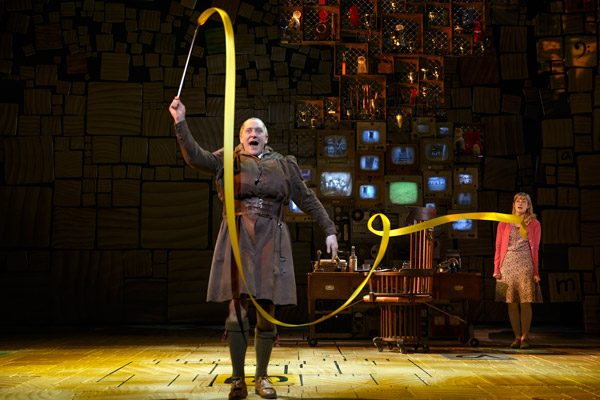
“Matilda” is pure Broadway magic on every level
BY CHRISTOPHER BYRNE | A significant measure of Roald Dahl’s genius was his ability to understand the darkness inherent in childhood from a child’s perspective. His 15 novels are beloved by young readers for what they perceive as his honesty — expressed in abstract comedy and absurd situations — about what they experience in the world. His characters — Charlie Bucket from “Charlie and the Chocolate Factory,” James Henry Trotter from “James and the Giant Peach,” and Matilda Wormwood from “Matilda” — are his best-known characters from these quintessentially Jungian fables. Each must overcome disconnected, selfish, and chaotic adults to survive and grow.
Of all of these, “Matilda” is perhaps Dahl’s most searing critique of self-involved adults whose values are askew and inimical to the growth and education of children. Written at the end of Dahl’s career, it offers all his trademark humor and whimsy but his indictment of mainstream culture is more pointed and angry than in his earlier works.
Matilda is a freak in the Wormwood home. Her parents barely acknowledge her, and when they do it’s to belittle her native intelligence and curiosity and her devotion to — gasp! — reading. Matilda’s mother is a vacuous ballroom dance competitor and her father is a corrupt car salesman trying to foist off clunkers on some Russian businessmen. Her brother is nondescript and dull, besotted with television.
Matilda, though, is no wimp; she gets back at her family by playing nasty practical jokes. Like any real child, she’s not perfect. When Matilda is sent to Crunchem Hall (clearly a nod to Dickens’ Dotheboys Hall from “Nicholas Nickleby”), she ultimately becomes a hero, using her gifts and intelligence to prevail over the villainous headmistress Agatha Trunchbull, as well as everyone and everything else that holds her back.
In adapting this story for the stage, book writer Dennis Kelly and composer and lyricist Tim Minchin have created nothing less than a masterpiece of musical theater. Combining the sensibilities of a British pantomime with delightfully garish music hall moments and oddly affecting characters, the piece is rich and sophisticated — a children’s tale for thinking adults. At the same time, there’s plenty to delight any child over age 8, making this a bona fide family show.
Minchin’s score is varied and highly musical, marrying different styles to fit the dark situations of Matilda’s rebellion, particularly in “Naughty,” and in the ironically lyrical “When I Grow Up,” which opens the second act. Minchin has written lyrics sensitive to how kids express themselves — which is a rare talent.
The company is uniformly excellent. Gabriel Ebert as the nefarious Mr. Wormwood is hilarious throughout, and he has one of the best songs in the show, “Telly,” an indictment of the brain-dead consumption of entertainment. As his wife, Leslie Margherita is somewhere between Carmen Miranda and Lucy the Slut from “Avenue Q.” Bertie Carvel is brilliant as Agatha Trunchbull, Crunchem Hall’s evil and vindictive headmistress who is a former hammer throw champion. Each performance is informed by the fact that we’re looking at them through Matilda’s eyes, and their grotesque Grand Guignol style is exactly at the pitch that an overly imaginative child would take them in. All three are brilliant.
Four young actresses rotate as Matilda. I saw Oona Laurence, and it would be hard to imagine anyone more perfect in the role. Whether nasty or heroic, it’s impressive to see a child hold a Broadway audience in the palm of her diminutive hand. Lauren Ward is a sublime Miss Honey, and if she sometimes seems just too, too sweet, well, she serves as the counterpoint — or antidote — to the venal adults in Matilda’s mind.
Peter Darling’s choreography is inspired, at times hip hop-infused and consistently bold and original. Rob Howell’s Scrabble-tile sets and insanely imaginative costumes are great in every way. Matthew Warchus has directed this with a keen sense of the piece’s pantomime and music hall elements, balancing the abstract and magical elements of the tale with the story of a little girl’s wounded heart seeking a safe haven.
The original production of “Annie” inspired a generation of girls to pursue their theatrical dreams. “Matilda” is very likely to have the same affect on the current crop of little girls. At the very least it will be wowing audiences on Broadway for a long time to come.






























